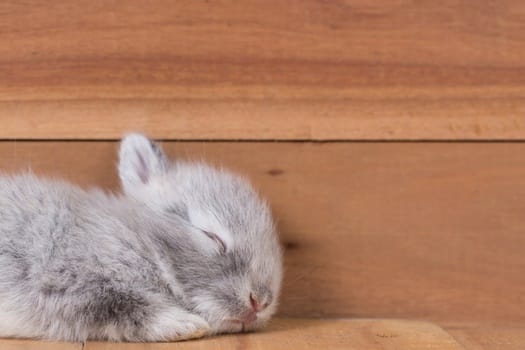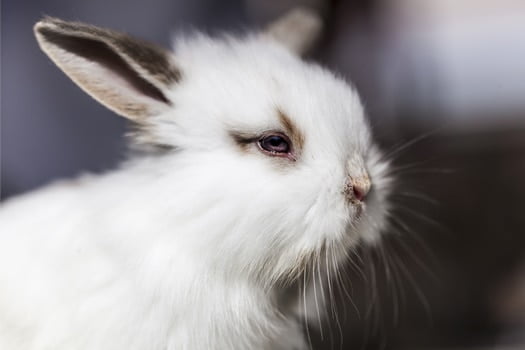The eyes of a rabbit seem to be open constantly. These small animals appear never to blink, but lagomorphs do open and close their eyes occasionally, just not nearly as often as humans.
Rabbits rarely blink their eyelids. Rabbits only blink ten or twelve times an hour. You may never see it because rabbits have a nictating membrane, or third eyelid, in front of the cornea. This transparent eyelid keeps a rabbit’s eyes moist, negating the need to blink.
If your rabbit is blinking a lot, her eye is likely irritated. Check for any foreign objects or debris trapped in around the eye or eyelid. If your rabbit will not open her eyes at all, she has a medical problem. She is not producing tears naturally, so you need to clean her eyes carefully.
Do Rabbits Have Eyelids?
Rabbits have three eyelids. Your pet has eyelids above her eyes, just like other mammals. She also has a third eyelid, known as the nictating membrane, which is invisible to the naked eye.
The nictating membrane is colloquially referred to as a third eyelid. It is transparent, and located just in front of the cornea. The purpose of the nictating membrane is to keep the rabbit’s eyes moist. It acts as a shield, keeping dust, grit or dirt out of a rabbit’s eyes.
This is important to rabbits as they have large eyes. The cornea takes up around 30% of the rabbit’s entire eye. As a result, rabbits have good long-range vision and can see predators from miles away.
By regularly moistening the cornea, nictating ensures that a rabbit’s vision remains sharp. Rabbits rely on smell and hearing to identify friends and foes up close. Eyesight is critical as an early warning of danger, though.
Rabbit Third Eyelid Problems
A rabbit’s nictating membrane is at work throughout the day, even while your rabbit is sleeping. As a result, your pet may experience problems with her third eyelid. Common issues that could include:
- Trauma. If a rabbit is poked in the eye, her third eyelid can be damaged. It may be knocked out of place, or the tissue can be torn. A skilled vet can repair this damage.
- Prolapse. Sometimes, the nictating membrane can prolapse. This makes it start to protrude and become visible. This condition is known as cherry eye, and is common in dogs and rabbits. Cherry eye is not painful, and will only be treated if the rabbit’s life is in danger.
- Inflammation. If your rabbit has an eye infection, her nictating membrane may become inflamed. This will make her eyes bulge, and her eyes may produce a lot of tears.
- Cysts. Rabbits can develop cysts on the third eyelid, which needs to be treated surgically.
Often, damage to the nictating membrane is caused by trauma or an eye problem. In these cases, the issue is comparatively minor. Never ignore any signs of damage to the third eyelid, though. Cancer or heart disease can cause the nicitating membrane to prolapse.
Do Rabbits Blink?
Rabbits blink their eyes, but not as often as humans. Humans blink roughly twenty times per minute. Some rabbits blink their eyelids as little as twelve times per hour.
This is due to the nictating membrane. When this eyelid blinks, it is referred to as nictating. Rabbits nictate almost constantly, so they don’t need to blink their exterior eyelids.
If your rabbit is blinking continuously, then something is amiss. Check that she does not have any debris in her eye. Your rabbit may have got something trapped in her eye while playing or foraging.

Do not shine a torch in your rabbit’s eyes to look for foreign objects. This will blind her, and likely frighten her. Instead, lower her eyelid and brush the area softly. Use your little finger or a soft cloth.
If you do not find anything untoward, watch your rabbit for a few hours. She may have just temporarily irritated her eye. She may have poked herself in the eye with a piece of hay while eating.
If the blinking does not subside, check the lighting in your home. Rabbits are sensitive to bright lights. Rabbit vision is engineered to see best at dawn and dusk, so your pet prefers dim light. Unfortunately, rabbits don’t have good night vision.
If the behavior continues, an eye infection is likely. Alternatively, it could be glaucoma or conjunctivitis. Antibiotics will often clear such concerns up, but time may be of the essence. Glaucoma, in particular, is dangerous if left untreated.
Do Rabbits Close Their Eyes?
Rabbits are capable of closing their eyes. In fact, baby rabbits do not open their eyes until they are around ten days old. It’s rare for an adult rabbit to close her eyes fully, though.
The reason for this is safety. Rabbits do not need to close their eyes to sleep. The nictating membrane allows rabbits to doze with their eyes open. This way, the rabbit remains alert to danger and can quickly flee if necessary. Rabbits typically only close their eyes for three reasons:
- Your rabbit is exhausted, and has fallen into a very deep sleep. This will only happen if your rabbit feels completely safe. It’s rare for a rabbit that’s new to a home to close her eyes.
- Your rabbit is enjoying petting or grooming. If your pet closes her eyes while you do this, do not stop. She loves the attention and feels completely relaxed.
- Your rabbit has a medical concern that is preventing her from opening her eyes. This can often be resolved by home cleaning. Don’t go to the vet without cleaning her eyes first.
You’ll know if your rabbit is sleeping or relaxed. She may just roll over and fall asleep with her eyes closed. This is common after mid-morning exercise, as this is when rabbits are most energetic.
This can look scary, resembling heart failure. It’s actually a natural behavior, known as flopping. Carry your pet to her hutch. Make her comfortable, and leave her alone.
There will be no mistaking a contented rabbit closing her eyes in pleasure. Purring, tooth clicking, or other noises that denote pleasure will accompany this behavior. Just be warned. If you stop petting, your rabbit may nip you. She decides when petting is finished, not you.
My Rabbit Will Not Open Her Eyes
If your rabbit will not open her eyes, she is likely unable to do so. This behavior will be accompanied by heightened reactions in the ears and nose. Your rabbit is using senses of hearing and smell to compensate for this lack of sight.
While it’s true that rabbits can live without eyesight, this is not something to ignore. Your rabbit has an issue. It’s likely to be a build-up of crust around the eye. This happens when the eye does not generate enough moisture. You can resolve this by cleaning your rabbit’s eyes. To do this:
- Moisten a soft cloth or cotton pad with warm water.
- Relax your rabbit with petting, and gently place her in your lap.
- Hold the cloth below your rabbit’s eye. Do not apply pressure, and do not move it. This will soften any hardened crust.
- After a few moments, gently wipe the area below the eye. Look for evidence of an external substance being removed.
If this is successful, your rabbit will open her eyes as normal. She may be struggling to generate tears, though. This will be why her eyes dried out, and became welded closed.
To prevent this from happening again, look for a natural tear generating eye drop. This must be rabbit-safe. Never use human medicine.
In these instances, make eye cleaning a regular part of your rabbit’s grooming and hygiene routine. If you can prevent this issue from occurring, your pet will be happier and calmer.
Do Rabbits Sleep with Their Eyes Open?
When a rabbit is sleeping, it will often look like her eyes are open. In reality, the nictating membrane offers the rabbit the shield that she needs. Your rabbit is asleep, but she is also alert. This is known as paradoxical sleep.
With this in mind, do not make any sudden movements or loud noises. Your pet will be startled, and immediately go into self-preservation mode. This will be a fight-or-flight response. The rabbit will lunge and nip, or more likely flee.
If her eyes are open, it can be hard to know if a rabbit is sleeping. Signs include:
- The rabbit’s nose will be completely still. Sleep is one of the few times that a rabbit’s nose does not move.
- The rabbit’s face and body will twitch, though. Your pet is dreaming. If your pet looks like she is running on the spot, this could be a nightmare.
- The rabbit’s ears are folded down. This suggests that your pet is dropping into a deeper sleep. Her attentiveness is waning.
- The rabbit is purring. She is relaxed and catching up on sleep after playing. Think of purring as rabbit snoring.
- The rabbit burrows herself into cushions or under furniture. In her hutch, your pet may retreat into a corner or behind a box. This is mimicking the wild instinct to sleep underground.
If your rabbit is sleeping, do not disturb her. Even if she seems to be having a bad dream, don’t wake her up. Regardless of whether her eyes are open or closed, rabbits need sleep.
Rabbits do not blink in a way that humans can see. Do not be worried if your pet never seems to blink. Her nictating membrane is doing the work for her.
It’s arguably more concerning if you do see your pet blink. Watch her eye movements carefully. A rabbit should always spend more time with her eyes open than closed.

